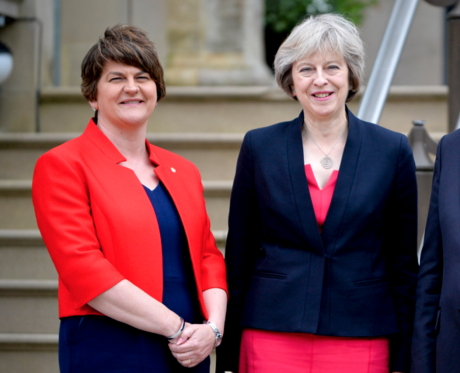
DUP leader Arlene Foster and UK prime minister Theresa May. Image, gov.uk, fair use.
A former Europe minister has today called for a “full and proper investigation” into a controversial £435,000 donation towards the DUP’s Brexit campaign, as new details emerge of a substantial fine linked to the transaction.
Theresa May’s allies in parliament, the Democratic Unionist Party (DUP), have always insisted that the donation, channelled via a secretive group known as the Constitutional Research Council (CRC), complied fully with the law.
However, openDemocracy has now learned that a £6,000 fine imposed by the Electoral Commission and paid in full last month was connected to the CRC. Labour MP Chris Bryant has written to the Northern Ireland Secretary, James Brokenshire, stating that it “cannot possibly be right” for details of one of the highest-ever fines imposed by the Electoral Commission to be kept secret.
“Failures by a regulated entity”
The Electoral Commission revealed on its website last month (as first spotted by The Detail) that it had imposed
a £6,000 sanction connected to a political donation
in Northern Ireland, but gave no name, offence, or summary of the decision. The
Commission stated only that it imposed the penalty due to “failures by a
regulated entity” but could not “disclose further information” because of legal
restrictions.
Bryant has asked Brokenshire to confirm who the “regulated entity” is, and
whether the fine relates to the unprecedented £435,000 donation given to Mrs
May’s Westminster allies, the Democratic Unionist Party (DUP), in order to
campaign for Brexit.
The £435,000 donation – a much larger sum than the DUP has ever spent on an electoral campaign in its history – attracted particular controversy because almost none of the cash was spent in Northern Ireland. Yet the donor secrecy laws which apply to Northern Ireland, and not the rest of the UK, have allowed the donors(s) to remain anonymous.
In his letter to the Northern Ireland Secretary, Bryant says of the Electoral Commission’s £6,000 fine:
“Whatever the rights and wrongs of maintaining secrecy about financial donations in Northern Ireland, it cannot possibly be right to keep secret the details of a regulated entity being found to have broken electoral law and being fined a substantial amount. No other judicial or quasi-judicial decision of this nature is kept secret in the UK.”
“No comment”
The Electoral Commission’s
office in Belfast would make no comment on their own investigation nor on the
casework that led to the high-level fine.
However, political sources in Northern Ireland with knowledge of the
Commission’s affairs have confirmed to openDemocracy that the substantial
sanction was connected to the Constitutional Research Council (CRC) – the
secretive group that channelled the £435,000 to the DUP in Belfast.
The £6,000 fine was paid in
full to the Commission on August 30.
openDemocracy contacted the CRC’s chair, Glasgow-based Richard
Cook, and
asked him to confirm details of the fine; why his organisation had been
sanctioned by the Electoral Commission, and what part of Northern Ireland’s
electoral law had been broken. He was also repeatedly asked why both he and the
DUP had insisted no laws had been broken, and when he had learned that the
Commission was investigating the cash transfer.
Throughout the conversation, Mr Cook was given multiple opportunities to
dismiss the listed £6,000 fine as nothing to do with the Constitutional
Research Council or the DUP. He declined to do so, or to make any further
comment.
End donor secrecy
After openDemocracy first revealed the scale of the secret
donation to the DUP earlier this year, we reported on Mr Cook’s business connections to a former Saudi spy boss and to
an individual with alleged links to a major arms scandal, and yesterday
published the results of our investigation into a
list of key figures in relation to the donation.
Although current electoral rules in Northern Ireland allow political parties to protect the identities of donors and funding, the government is expected to announce this will soon change.
However the UK government’s policy strategy on full transparency is likely to be highly influenced by their £1 billion deal with the DUP. The Conservative party's minority government is being propped up in parliament by the DUP, and any change which exposed the DUP-CRC donation arrangement is likely to be resisted.
Rather than backdate transparency rules to 2014 – which would reveal the source of the £435,000 DUP cash – Brokenshire announced earlier this year that the change, which will be made through secondary legislation, would only apply to donations and loans received after 1st July 2017.
Government and DUP sources have denied that this is ‘protection’ for the DUP, as part of their deal to keep the Conservatives in power.
‘A full and proper investigation?’
Last month the Electoral
Commission published details of a £3,500 fine on UKIP related to campaign
expenditure.
In June, the Commission fined the owner of Butlin’s, Peter Harris, £12,000 for
breaking spending return rules. Mr Harris spent £420,000 on the Leave campaign
in last year’s EU referendum.
Also in June, the DUP were fined £4,000 for failure to complete campaign
expenditure returns for the 2016 Assembly elections.
Bryant’s letter to Mr Brokenshire regarding the mystery £6,000 fine pointedly ends: “Does the fine relate to the DUP’s donation from the CRC? Will you launch a full and proper investigation into how the money was spent? And will you ensure that the truth comes to light?”
This is day two of openDemocracy's week-long #BrexitDarkMoney series. See yesterday's revelations here and our reasons for publishing this series here.
Read more
Get our weekly email

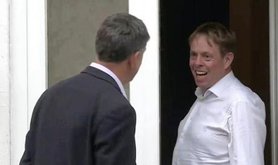
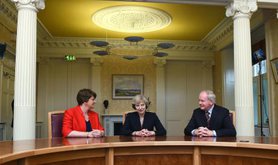

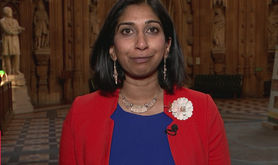
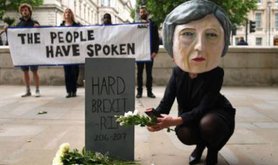
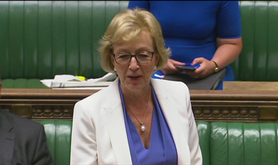

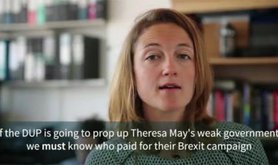
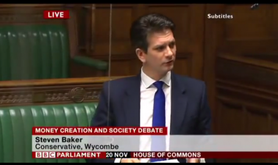


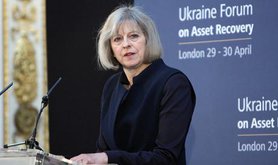






Comments
We encourage anyone to comment, please consult the oD commenting guidelines if you have any questions.